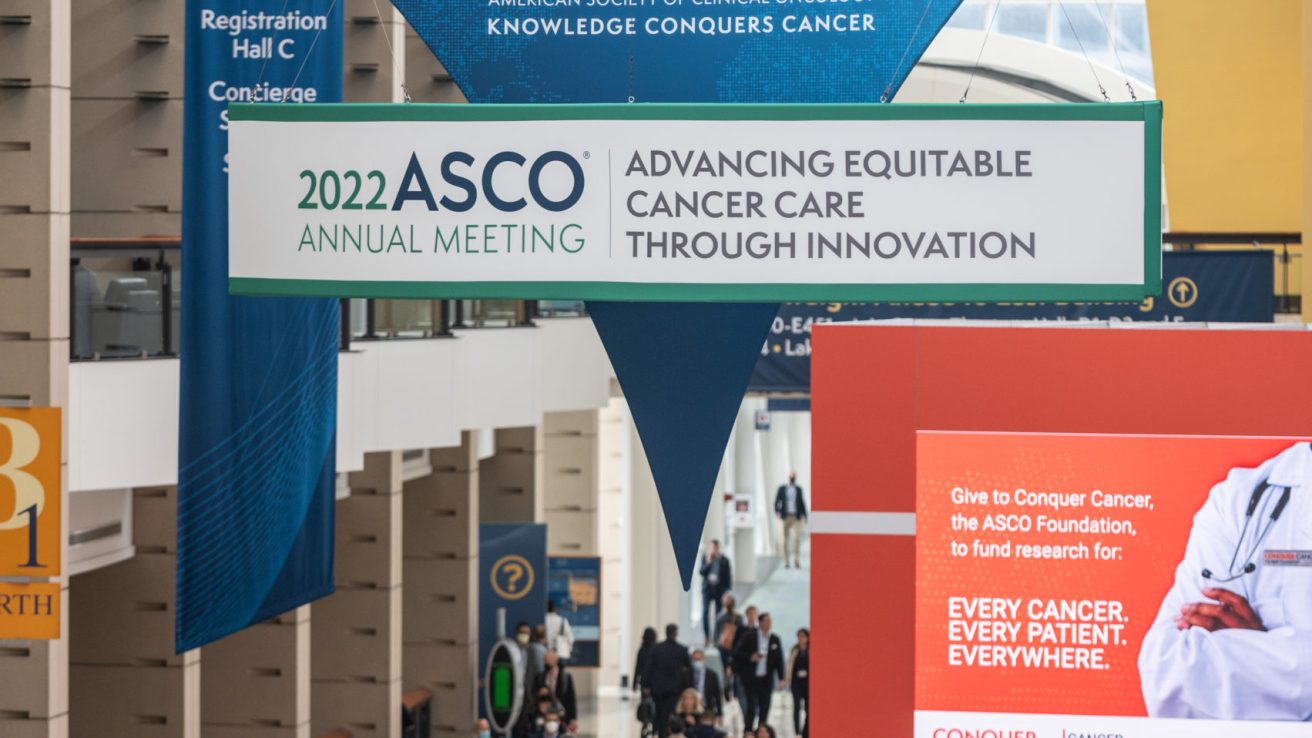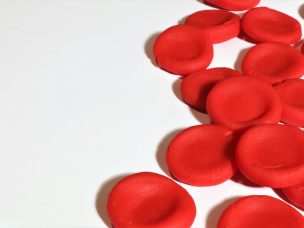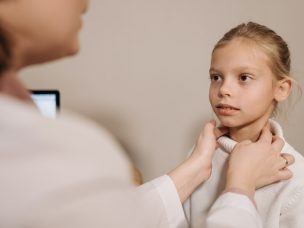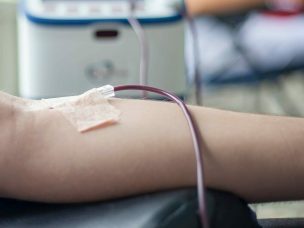Photo by © ASCO/Nick Agro 2022.
Written and edited by Lauren Weinand, M.D.
Two groundbreaking studies presented at the 2022 ASCO Annual Meeting discussed the use of brentuximab vedotin to treat classical Hodgkin lymphoma (CHL) in adults as well as children and adolescents. Here are some of the highlights, including MD Newsline’s Q&A session with the lead study authors.
Highlights from the Studies:
The study in adults by Stephen M. Ansell, M.D., Ph.D., and colleagues was an updated overall survival (OS) analysis after 6 years of follow-up on ECHELON-1, an open-label, randomized phase 3 trial that compared the efficacy and safety of A+AVD (brentuximab vedotin + doxorubicin, vinblastine, and dacarbazine) versus ABVD (doxorubicin, bleomycin, vinblastine, and dacarbazine) in adults with previously untreated stage III/IV CHL.
- One of the unique characteristics of this study is that it included patients 60 and over, which made up 15% of study participants.
- A+AVD significantly improved OS with a 41% reduction in risk of death compared with ABVD.
- OS benefit was generally consistent across subgroups.
- Male patients seemed to benefit more than female patients.
- Age, non-white race, ECOG performance status score, and PET2 status were identified as the covariates with the greatest evidence of association with OS.
- A+AVD reduced the risk of progression or death by 32% compared with ABVD.
- Fewer patients died from HL and disease- or treatment-related complications with A+AVD vs. ABVD.
- A+AVD is the first regimen to show an improvement in OS vs. ABVD in patients with previously untreated advanced cHL.
- Based on these data, A+AVD should be considered a preferred first-line treatment option for patients with previously untreated stage III or IV cHL.
The study in children and adolescents by Sharon M. Castellino, M.D., M.Sc., and colleagues was an open-label, randomized phase 3 trial that compared the efficacy and safety of brentuximab vedotin with doxorubicin, vincristine, etoposide, prednisone, and cyclophosphamide (Bv-AVE-PC) to the standard pediatric regimen of ABVE-PC, inclusive of bleomycin in children and adolescents with stage IIB with bulk/IIIB/IVA/IVB CHL.
- This study was the first randomized phase 3 trial of brentuximab vedotin in children and adolescents.
- Bv-AVE-PC improved event-free survival (EFS) with a 59% reduction in risk of death compared with ABVE-PC without an increase in toxicity and with less need for radiation therapy.
- Bv-AVE-PC is a new standard for frontline therapy in pediatric high-risk CHL.
MD Newsline’s Q&A Session:
MD Newsline and Q&A panel moderator Neha Mehta-Shah, M.D., engaged with the lead authors of these studies over a Q&A session.
MD Newsline:
Specifically, how did Black patients on brentuximab vedotin fare compared to white patients and other racial/ethnic minority groups?
Stephen M. Ansell, M.D., Ph.D.:
“Good question. That is still in the process of being dissected a little bit better. However, in the multivariable analysis, race impacted survival. So, being Caucasian was associated with a better outcome vs. other races. So, that’s a challenge, and I think we need to dissect why that is, whether it was purely just access to medical care in the time of complications or other factors—I don’t have a good answer to that.”
Neha Mehta-Shah, M.D.:
“Dr. Castellino, did you see any differences in the outcomes by race?”
Sharon M. Castellino, M.D., M.Sc.:
“Yes, in a posthoc analysis where in the study 57% identified as non-white Hispanic, there was an advantage to brentuximab vedotin for both groups. So, pediatric patients are not influenced any less than adults by social determinants of health, but maybe they have a different ability to surmount those social determinants of health at times than patients who have chosen to enroll in a trial who are of minoritized race and ethnicity.”
Discussion of the Studies:
Alison J. Moskowitz, M.D., provided some final insight into the future of brentuximab vedotin for treating CHL in adults, children, and adolescents.
Alison J. Moskowitz, M.D.:
“In summary, at this point, for both advanced-stage Hodgkin lymphoma, specifically, stage III and stage IV, as well as high-risk Hodgkin lymphoma for pediatric patients, brentuximab-based chemotherapy is now the standard.
We’re starting to see some hints—from some promising results from smaller studies that need to be looked at in larger settings—that there’s a possibility that we can use brentuximab-based chemotherapy to get rid of or reduce the use of radiation therapy in some of these patients with advanced-stage HL.
Finally, to decide when we should use brentuximab-based chemotherapy, reduce therapy, or avoid radiation therapy, I believe that we’ll eventually be using biomarkers, such as ctDNA, MTV, 9p24.1, and many others, to help guide the best frontline therapy, and this will ultimately lead to optimizing cure and optimizing long-term toxicity and quality of life for our patients [1].”
Responses have been condensed and lightly edited.
Source:
[1] Ansell, S. M., Castellino, S. M., Moskowitz, A. J., & Mehta-Shah, N. (2022, June 3). Hematologic malignancies—lymphoma and chronic lymphocytic leukemia [Oral abstract session]. 2022 ASCO Annual Meeting, Chicago, IL. https://meetings.asco.org/2022-asco-annual-meeting/14383?presentation=207241#207241










